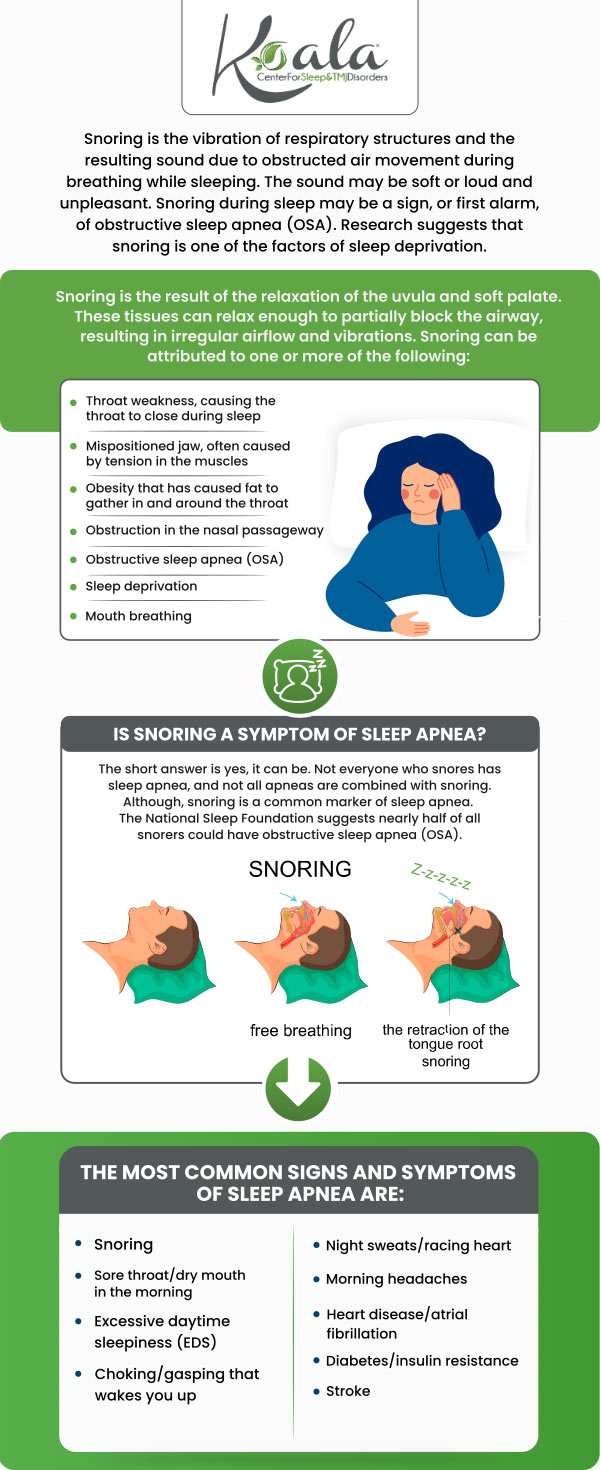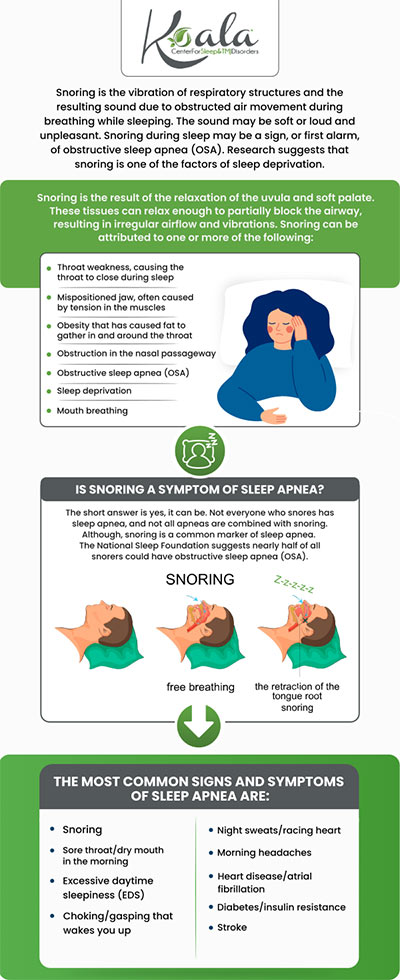Is Snoring Waking You Up?
Do you always wake up to the snoring noise of your partner? Come for a comprehensive solution with you partner at Koala Center For Sleep & TMJ Disorders. For more information, call us or visit us online to book an appointment. We have convenient locations across the U.S. in Bloomington IL, Peoria/Dunlap IL, El Paso TX and Wausau WI.


Table of Contents:
What Is Snoring?
Should I Be Worried About Snoring?
Is Snoring a Symptom of Sleep Apnea?
A night of snoring with interrupted sleep can lead to daytime sleepiness, fatigue, drowsy driving, depression, and impaired cognitive skills. But is it really the snoring that’s waking you up? Perhaps it’s your sleeping partner’s elbow or a serious condition known as obstructive sleep apnea (OSA).
Snoring can be a nuisance both for the person who snores and for the person who sleeps near the snorer. That’s what it was like for Jerry and his wife for several years. It is estimated that if a snorer arouses 27 times an hour, the sleeping partner’s sleep can be interrupted up to 21 times an hour. According to Science Direct, approximately 40% of the population snores, while 95% of those diagnosed with sleep apnea present with the symptom of snoring.
Are there adverse effects of snoring? In this post, we will explain what causes snoring, explore some factors that make people susceptible, and explain when to be concerned about snoring, specifically as a marker of obstructive sleep apnea. The health implications of OSA by the majority of pulmonary and medical professionals research papers reviewed is staggering.
Snoring occurs when you are inhaling or exhaling through your upper airway, the air meets the relaxed tissues and uvula in your throat, your tongue falls backward, and these tissues vibrate. Mouth breathing is a common occurrence among snorers with complaints of a dry mouth after a restless night of sleep.
There are a variety of factors that affect your likelihood of snoring. Here are a few variables that make it more likely for any given person:
1. Weight: Since snoring is caused by vibrating tissues in your throat and sinuses, the more tissues you have around your throat and neck area, the more likely you are to snore, due to internal narrowing of the airway. Shedding any excess weight in that area can decrease your tendency to snore.
2. Gender: Overall, men are more likely to snore while they sleep. This is because men typically have smaller airways. This is not to say that women don’t snore or that all men snore, but as a whole, men snore more. Sleep Education.org states about 40 percent of adult men and 24 percent of adult women are habitual snorers.
3. Nasal problems: If you have allergic rhinitis or a head cold, your nasal passages become stuffed with mucus, blocking your airways. This leads to more pronounced snoring but can be temporary.
4. Body makeup: The size of various organs and body parts can affect your tendency to snore. For instance, large tonsils, a long soft palate, a large tongue, and the uvula can result in your airway becoming narrower and lead to snoring.
Almost everyone will snore at some point in their life. For some people, snoring is a chronic issue, while for others, it may occur rarely. Generally speaking, occasional snoring should not be a cause for concern. Many causes are temporary and not dangerous. For instance, if your partner is snoring while they have a head cold, you do not need to be as concerned. If you find that your snoring is consistently waking you up, you should consider seeing a medical dental sleep clinic to determine if sleep apnea is present and if oral appliance therapy could be right for you.
The short answer is yes, it can be. Not everyone who snores has sleep apnea, and not all apneas are combined with snoring. Although, snoring is a common marker of sleep apnea. The National Sleep Foundation suggests nearly half of all snorers could have obstructive sleep apnea (OSA).
The most common signs and symptoms of sleep apnea are:
– Snoring / sore throat / dry mouth in the morning
– Excessive daytime sleepiness (EDS)
– Choking / gasping that wakes you up
– Waking up for night trips multiple times
– Night sweats / racing heart
– Morning headaches
– Cognitive / memory difficulty
– Depression
– Heart disease / atrial fibrillation
– Diabetes / insulin resistance
– Stroke
For more information and a consultation, contact a Koala® Center For Sleep & TMJ Disorders near you.

Additional Services You May Need
▸ KoalaKIDZzz®
▸ Sleep Apnea
▸ Snoring
▸ TMJ Disorder
▸ Fatigue
▸ Sleep Disorders
▸ Weight Loss
▸ CPAP Alternative
▸ Oral Appliances




